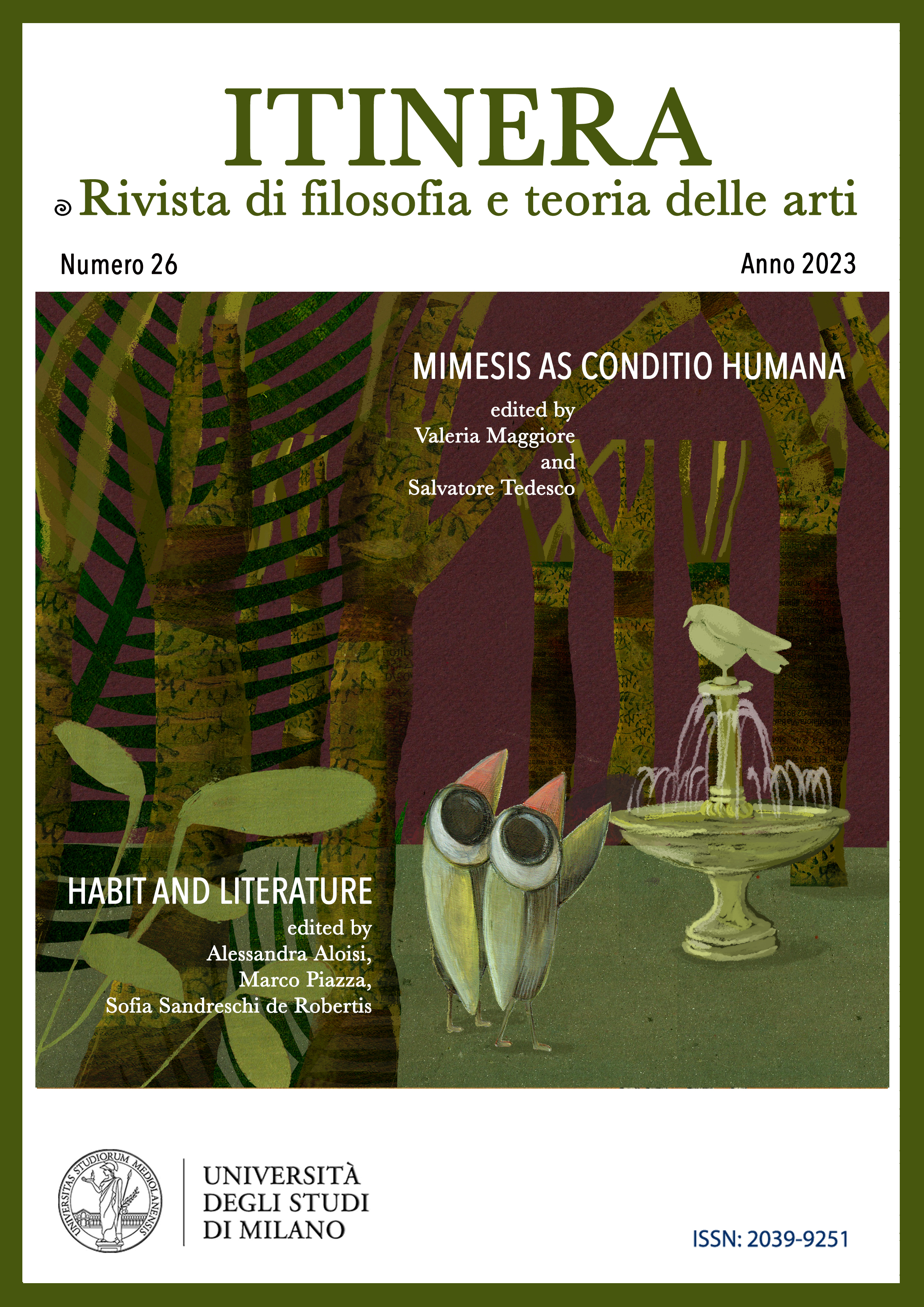Stendhal and Rousseau: Habit, Interiority and Exception
DOI:
https://doi.org/10.54103/2039-9251/22251Parole chiave:
Stendhal, Rousseau, Habitual Self, French RevolutionAbstract
Le Rouge et le Noir is taken as an example of a novel in which the hero, and some other characters, experience strong tension between inner consciousness and social habits. Stendhal’s novel is a particularly significant example because it is shaped by the immediate afterlife of the French Revolution and the writings of Rousseau. The revolutionary rupture with habit intersects with the themes of a consciousness looking for inner existence and the role of inner passions. The Revolution was an exception, prolonged by the rise of Bonaparte which appeals to a hero frustrated by the habitual conformity of anti-revolutionary France after the fall of Bonaparte. He seeks a great career, and he seeks grandeur in love, always combining passions with strategy in an unstable mix. He moves from love with a comparative innocent to love with a woman who shares his obsessions though they have different objects. The final crisis of the novel leads to a breakdown of the hero’s habitual self, in an ending in which passions becomes both destructive violence and an idyllic solitary resignation. The journey into an interiority, through exceptional breaks with habit finds a culmination. This achievement rests on Stendhal writing in a world after Rousseau and understanding the full extent of this requires a rounded understanding of Rousseau, along with his context.
Downloads
Riferimenti bibliografici
Auerbach, E., Mimesis: The Representation of Reality in Western Literature, translated by Willard H. Trask, Princeton University Press, Princeton NJ 1953.
Bataille, G., La littérature et le mal, Gallimard, Paris 1957.
Burke, E., A Letter from Mr Burke to a Member of the National Assembly; In answer to some objections to his book on French affairs, J. Dodsley, London 1791.
Carlisle, C., On Habit, Routledge, London 2014.
Constant, B., Principes de politiques : Applicable à tous les gouvernements, Hachette Littératures, Paris 1997.
De la Rochefoucauld, F., Collected Maxims and Other Reflections: New Translations with parallel French Text, translated and edited by E.H. Blackmore, A.M. Blackmore and Giguère, F., Oxford University Press, Oxford 2007.
de Maistre, J., Du Pape, Garnier, Paris 1984.
de Maistre, J., Écrits sur la Révolution, Presses Universitaires de France, Paris 1989.
de Tocqueville, A., De la démocratie en Amérique I & De la démocratie en Amérique II, Gallimard, Paris 1961.
Foucault, M., Dits et Ecrits I, éd. par D. Defert, F. Ewald et J. Lagrange, Gallimard, Paris 1994 [reprinted from Librairie Armand Colin, Paris,1962].
Foucault, M., Il faut défendre la société: Cours au Collège de France, 1975-1976, éd. par F. Ewald, A. Fontana et M. Bertani, Gallimard/Seuil, Paris 1997.
Foucault, M., Les mots et les choses : Une archéologie des sciences humaines, Gallimard, Paris 1966.
Force, P., Self-Interest before Adam Smith: A Genealogy of Economic Science, Cambridge University Press, Cambridge 2003.
Girard, R., Mensonge romantique et vérité romanesque, Bernard Grasset, Paris 1961.
Gottmann, F., Du Châtelet, Voltaire and the Transformation of Mandeville’s Fable, in “History of European Ideas”, 38, 2, 2011, pp. 218-232.
Hugo, H. E., Two Strange Interviews: Rousseau’s Confessions and Stendhal’s le Rouge et le Noir, “The French Review”, 25, 3, 1952, pp. 164-172.
Jansenius, C., Augustinus, 3 voll., Typis Jacobi Zegeri, Louvain 1640.
Lukács, G., Studies in European Realism: A Sociological Survey of the Writings of Balzac, Stendhal, Zola, Tolstoy, Gorki and others, translated by Edith Bone, Merlin Press, London 1972 [reprinted from Hillway Publishing 1950].
Machiavelli, N., The Discourses, edited and translated by Julia Conaway Bondanella and Peter Bondanella, Oxford University Press, Oxford 1997.
Manzini, F., Stendhal, Reaktion Books, London 2019.
Mendham, M.D., Rousseau’s Discarded Children: The Panoply of Excuses and the Question of Hypocrisy, in “History of European Ideas”, 41, 1, 2015, pp. 131-152
Montesquieu, De l’esprit des lois I, Garnier Flammarion, Paris 1979.
Pascal, B., Les Provinciales, Folio, Paris 1987.
Porter, D., Rousseau’s Legacy: Emergence and Eclipse of the Writer in France, Oxford University Press, New York 1995.
Rousseau, J.J., Dialogues: Rousseau juge de Jean-Jacques – Le Lévite d’Ephraïm, Flammarion, Paris 1999.
Rousseau, J.J., Discours sur l’économie politique et autres textes, Flammarion, Paris 2011.
Rousseau, J.J., Discours sur l’origine et les fondements de l’inégalité parmi les hommes, éd. par B. Bachofen and B. Bernardi, Flammarion, Paris 2011.
Rousseau, J.J., Du contrat social, éd. par B. Bernardi, Flammarion, Paris 2011.
Rousseau, J.J., Julie, éd. par E. Leborgne and F. Lotterie, Flammarion, Paris 2018.
Rousseau, J.J., Les rêveries du promeneur solitaire, Le livre de poche, Paris 2001.
Stendhal, De l’amour, Gallimard, Paris 1984.
Stendhal, Le Rouge et le Noir : Chronique de 1830, éd. par Michel Crouzet, Librairie Générale Française, Paris 1997.
Dowloads
Pubblicato
Come citare
Fascicolo
Sezione
Licenza
Copyright (c) 2024 Stocker

Questo lavoro è fornito con la licenza Creative Commons Attribuzione - Condividi allo stesso modo 4.0.
Gli autori che pubblicano su questa rivista accettano le seguenti condizioni:
1. Gli autori mantengono i diritti sulla loro opera e cedono alla rivista il diritto di prima pubblicazione dell'opera, contemporaneamente licenziata sotto una Licenza Creative Commons - Attribuzione - Condividi allo stesso modo 4.0 internazionale che permette ad altri di condividere l'opera indicando la paternità intellettuale e la prima pubblicazione su questa rivista.
2. Gli autori possono aderire ad altri accordi di licenza non esclusiva per la distribuzione della versione dell'opera pubblicata (es. depositarla in un archivio istituzionale o pubblicarla in una monografia), a patto di indicare che la prima pubblicazione è avvenuta su questa rivista.
3. Gli autori possono diffondere la loro opera online (es. in repository istituzionali o nel loro sito web) prima e durante il processo di submission, poiché può portare a scambi produttivi e aumentare le citazioni dell'opera pubblicata (Vedi The Effect of Open Access).





